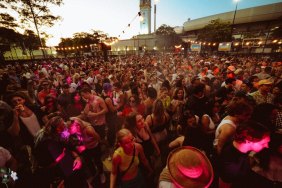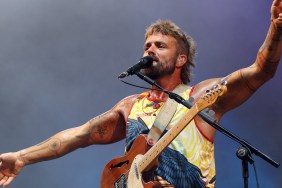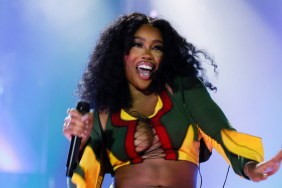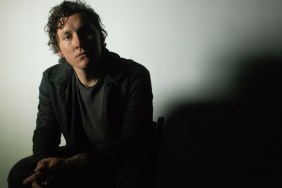Why is it that musician’s captivate us so? It’s a question that opens up an almost endless discussion that inevitably descends into disecting specific parts of certain songs that resonate with us on an instinctual and intellectual level. In a broader sense though, a large part of the civilian fascination with musicians (or any form of artist) stems from the courage of their convictions: a willingness to not only lead a life less conventional but to also express personal concepts and private vulnerabilities that can lead to a sense of authentic communal belonging.
It’s this kind of dedication to the pursuit of truth and transparency that is personified by the career of Xavier Rudd and his latest record Spirit Bird.
The 7th LP from Rudd in the span of a decade, Spirit Bird for the most part continues the multi-instrumentalist’s trend of applying his craft to the examination of our natural surroundings and the various distractions that can dull or even sever our connection to the earth.
Yet, Rudd’s new record comes not only from external observation but also internal exploration, as evident in the song Comfortable In My Skin. It’s been approximately a year since Rudd was forced to undergo back surgery in order to help repair three herniated disks, bone spurs and nerve damage, most likely caused by an hereditary condition. Forced into a state of restricted movement, Comfortable In My Skin comes from a time when there was little more to do than self-reflect.
“I had to have back surgery and I was physically debilitated when I wrote that song,” Rudd explains. “After being a really physical person, it kind of forced me to sort of look inward a bit and just take a good hard look at myself, and it [Comfortable In My Skin] sort of comes from that place.”
Following on from Comfortable In My Skin is the title track Spirit Bird. Beginning as a beautiful folk tune, the song builds into a heated political affair, blending two very distinct experiences into one seamless song. Spirit Bird also functioned as the catalyst to push Rudd into finally achieving his goal of sampling native bird calls and setting them rhythmically to music: a reoccurring theme throughout the record.
“That song [Spirit Bird] was one of the strongest songs that has ever come through me. It…was born in the Kimberley a few years ago when I was driving down a track and I had this urge to stop. I wasn’t sure why, then I got out of the car and turned around and there was a dead tree and big red-tail cockatoos in the tree. There was one bird that…she just looked straight through me and she was creaking and groaning and talking to me. All these images just rushed through my head and it was like a message of an ancient time and what’s been going on in that country for so long, devastation included”, Rudd elaborates.
“That night the first of that song just called out of me, and I wrote the lyrics in the sand. It sort of sat after that, I didn’t touch it again. It was kind of emotional when I first wrote the first half and then when I was finishing the record in Canada last year, I started to play that song by the fire one night.”
“The back half just poured about of me again and I ended up in tears…I wrote it down and then the next morning I woke up and…had all these messages and realised that at about the same time I wrote that song, the back end of it, the police had moved in on James Price Point in Kimberley and started to drag Elders off their country and bring in the bulldozers and start the acquisition of land up there, and that song had come through me around the same time. So I recorded it about two days later and that was Spirit Bird”
Rudd’s activism in regards to equality and the conservation and preservation of the environment is well documented. His latest single Bow Down serves as a moving message of understanding that, although we all endure busy lives, it’s still vital that individuals remain mindful of the sustainability of our planet.
On a larger scale, Bow Down raises the question of whether it is possible for the sustainability of the environment to ever be put before the pursuit of profit as long as there exists the capitalist dream that ultimately fosters a self-serving ideology of individual gain.
“I think human greed is the biggest problem this planet faces. Human greed is the biggest addiction human beings have and I think it’s too big a problem”, Rudd ponders. “It’s just important to respect and preserve this place and change our ways for as long as we possibly can for the future of our children. We are of this earth…just like anything, but we’ve just lost our way. I think slowing down the effects of our world on the environment is achievable simply by each individual becoming more conscious of the seasons and what’s happening around us.”
“You know people never take time just to observe it (the ecosystem) and be in touch with it and I think by simply doing that it brings you back to recognizing what’s happening around us in the natural world and in turn, including that into your life will bring a greater appreciation and a greater understanding and a greater desire to preserve.”
“I guess you could argue that if Aboriginal culture was included in society, in Australian society, if you take time back and white fellas actually embraced the culture and found the balance of Aboriginal people in terms of the two cultures working in harmony, then I think environmentally we’d have a lot more respect and our country would have been divided up a lot more intelligently, and I think environmentally we’d be in a better place. I think any connection to land helps the environment because it’s just consciousness.”
The still-to-be introduced Carbon Tax and proposed constitutional amendments to recognise Aboriginal and Torres Strait Islander’s as the first peoples of Australia could be construed as attempts to slow modern society’s impact on the environment and reconcile past injustices towards Indigenous culture on a government level.
For Rudd, however, such gestures are just more empty politicking as opposed to actual change:
“It’s about time the Australian government sped things up. This country environmentally is an embarrassment. There’s so much going on in this country that just shouldn’t be going on. I mean you look at the situation in the Kimberley”, Rudd affirms.
“Colin Barnett is just a cowboy and what’s going on up there right now is ridiculous, in a world heritage area, one of the last great wildernesses on the planet. I mean the Australian Government really doesn’t cherish the gift this country is and everybody knows Aboriginal people were the first people of this nation, so whoopee-fucking-do.”
“When was the last time you saw a photo of a Prime Minister sitting down by a fire…drinking a cup of tea with Elders, black fella way, and talking about what’s right and what’s wrong? There’s still the same ignorant racist system that’s been in place ever since white people came here. And little bits and pieces in parliament here and there…it’s just talk.”
Given the unguarded sincerity of his music, it’s not surprising that Rudd is willing to engage in such personal and political discussion. Another ‘outspoken’ public figure Rudd admires is that of the Sea Shepard’s Paul Watson, who is referenced in the record’s closing song Creating a Dream via the lyric, ‘Imagine Captain Watson had the final say’.
“I think Paul is one of the most important human beings that has ever walked this earth. I think that he’ll be praised for years and years to come and after he’s gone he’ll be studied, he’ll be talked about in schools. He’ll be a hero because he’s a long way ahead of a lot of us in his understanding of where this planets going,” Rudd envisages.
“He’s a true warrior like the days of old where, no matter what, he’d fight tooth and nail for what he believes. In a society where there’s a lot of talk and no action, Paul Watson stands on this own. He’s brilliant, he really is.”
The overall message of Creating a Dream is a plea for patience as the human race slowly builds towards racial and environmental harmony. Mankind’s seemingly impossible evolution towards peaceful resolution prompts the philosophical query of whether conflict and violence are ingrained in human genetics or a symptom of our current model of global society.
“I think a bit of both I’d have to say… I think greed and the global society is definitely – and fear, I think fear is a massive one. There’s so much fear burned into our society through the media and whatnot that fear keeps them on their back foot and people get sort of aggressive.”
“But at the same time, in order to survive on this planet, we were naturally born with that ability to strike if we have to, just like a snake. So I think it’s part of it to a point. If you poke a snake it’s going to bite, right”
Spirit Bird by Xavier Rudd is out today
Watch: Xavier Rudd – Follow The Sun
Watch: Xavier Rudd – Bow Down












